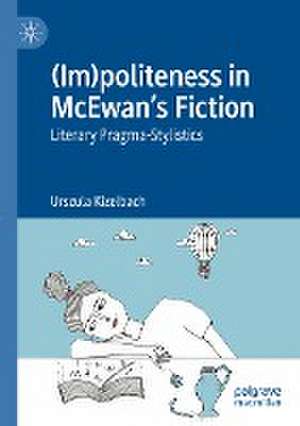(Im)politeness in McEwan’s Fiction: Literary Pragma-Stylistics
Autor Urszula Kizelbachen Limba Engleză Paperback – 24 feb 2024
| Toate formatele și edițiile | Preț | Express |
|---|---|---|
| Paperback (1) | 625.82 lei 38-44 zile | |
| Springer International Publishing – 24 feb 2024 | 625.82 lei 38-44 zile | |
| Hardback (1) | 727.48 lei 6-8 săpt. | |
| Springer International Publishing – 23 feb 2023 | 727.48 lei 6-8 săpt. |
Preț: 625.82 lei
Preț vechi: 687.72 lei
-9% Nou
Puncte Express: 939
Preț estimativ în valută:
119.75€ • 130.49$ • 100.91£
119.75€ • 130.49$ • 100.91£
Carte tipărită la comandă
Livrare economică 19-25 aprilie
Preluare comenzi: 021 569.72.76
Specificații
ISBN-13: 9783031186929
ISBN-10: 3031186923
Pagini: 231
Ilustrații: XI, 231 p. 1 illus.
Dimensiuni: 148 x 210 mm
Ediția:2023
Editura: Springer International Publishing
Colecția Palgrave Macmillan
Locul publicării:Cham, Switzerland
ISBN-10: 3031186923
Pagini: 231
Ilustrații: XI, 231 p. 1 illus.
Dimensiuni: 148 x 210 mm
Ediția:2023
Editura: Springer International Publishing
Colecția Palgrave Macmillan
Locul publicării:Cham, Switzerland
Cuprins
Chapter 1: Why Ian McEwan and Literary Pragma-Stylistics?.- Chapter 2: Pragmatics and the Analysis of Fiction.- Chapter 3: Narrative Tradition in Fiction: A Pragma-Stylistic Approach.- Chapter 4: Intradiegetic (Im)politeness or How the (Im)politeness Theory is used for Internal Characterisation.- Chapter 5: Extradiegetic (Im)politeness or How the Implied Author Communicates with the Reader.- Chapter 6: Conclusion.
Recenzii
“This book offers a comprehensive exploration of enlightening topics, providing an in-depth analysis of impoliteness in the works of a single author. … As a well-written book on pragmatics and stylistics, the volume has the potential to enhance our understanding of the pragmatic elements in literary texts. Hence, we strongly recommend this book to a broad spectrum of readers, including pragmatists, stylisticians, and literary scholars at all levels.” (Kaihang Zhao and Yansheng Mao, Journal of Pragmatics, Vol. 227, 2024)
Notă biografică
Urszula Kizelbach is an Assistant Professor in the Department of Studies in Culture at the Faculty of English, Adam Mickiewicz University in Poznań, Poland. She specialises in literary pragmatics, in particular the pragmatic analysis of Shakespearean drama and contemporary fiction. She published a book on (im)politeness and power in politics in Shakespeare’s histories titled The Pragmatics of Early Modern Politics (2014). She is a Polish Ambassador of the Poetics and Linguistics Association. She teaches stylistics, Shakespeare, the history of British literature and translation.
Textul de pe ultima copertă
This book is a pragma-stylistic study of Ian McEwan’s fiction, providing a qualitative analysis of his selected novels using (im)politeness theory. (Im)politeness is investigated on two levels of analysis: the level of the plot and the story world (intradiegetic level) and the level of the communication between the implied author and implied reader in fiction (extradiegetic level). The pragmatic theory of (im)politeness serves the aim of internal characterisation and helps readers to better understand and explain the characters’ motivations and actions, based on the stylistic analysis of their speech and thoughts and point of view. More importantly, the book introduces the notion of “the impoliteness of the literary fiction” – a state of affairs where the implied author (or narrator) expresses their impolite beliefs to the reader through the text, which has face-threatening consequences for the audience, e.g. moral shock or disgust, dissociation from the protagonist, feeling hurt or‘put out’. Extradiegetic impoliteness, one of the key characteristics of McEwan’s fiction, offers an alternative to the literary concept of “a secret communion of the author and reader” (Booth 1961), describing an ideal connection, or good rapport, between these two participants of fictional communication. This book aims to unite literary scholars and linguists in the debate on the benefits of combining pragmatics and stylistics in literary analysis, and it will be of interest to a wide audience in both fields.
Urszula Kizelbach is an Assistant Professor in the Department of Studies in Culture at the Faculty of English, Adam Mickiewicz University in Poznań, Poland. She specialises in literary pragmatics, in particular the pragmatic analysis of Shakespearean drama and contemporary fiction. She published a book on (im)politeness and power in politics in Shakespeare’s histories titled The Pragmatics of Early Modern Politics (2014). She is a Polish Ambassador of the Poetics and Linguistics Association. She teaches stylistics, Shakespeare, the history of British literature and translation.
Urszula Kizelbach is an Assistant Professor in the Department of Studies in Culture at the Faculty of English, Adam Mickiewicz University in Poznań, Poland. She specialises in literary pragmatics, in particular the pragmatic analysis of Shakespearean drama and contemporary fiction. She published a book on (im)politeness and power in politics in Shakespeare’s histories titled The Pragmatics of Early Modern Politics (2014). She is a Polish Ambassador of the Poetics and Linguistics Association. She teaches stylistics, Shakespeare, the history of British literature and translation.
Caracteristici
Presents the literary work as an object of an independent pragmatic study Offers a new application of (im)politeness theory as a tool for examining narrative levels in fiction Conducts a pragma-stylistic study of “impolite” communication on intra- and extradiegetic levels
